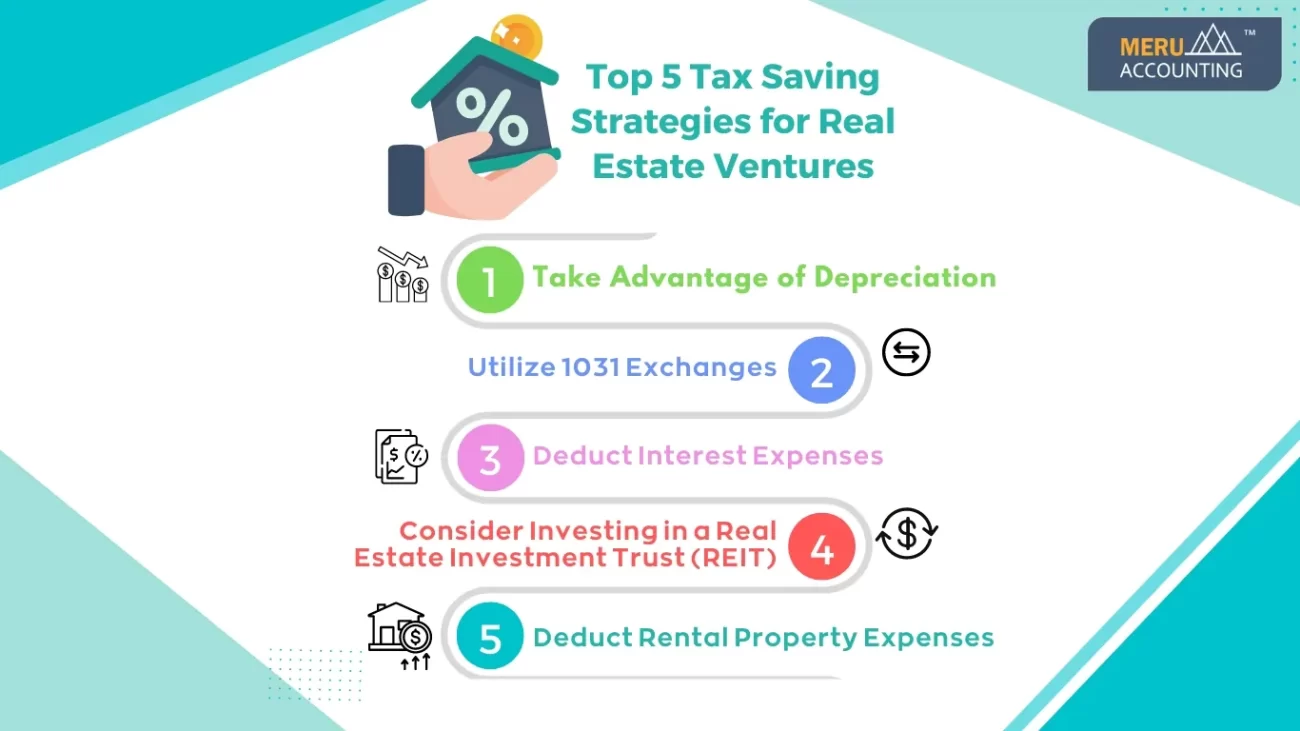
Best Strategy for Real Estate Businesses to Save Tax
The world of real estate taxation is complicated, requiring cautious and thoughtful navigation. Businesses must understand how to maximize all possible credits, deductions, and ownership arrangements in order to reduce tax implications and safeguard profitability. By carefully examining different expenses that can be written off such as mortgage interest, real estate taxes, and depreciation, investors can reduce their taxable income and boost their rate of return on investment.
Furthermore, it’s critical to carefully plan the timing of real estate transactions and depreciation schedules so that investors can take advantage of possibilities such as opportunity zones and like-kind exchanges to minimize or postpone paying capital gains taxes. It is essential to stay updated with evolving tax laws and regulations to formulate a robust tax strategy for real estate business. This ensures that investors can swiftly adapt to legislative changes and optimize their tax planning accordingly. By remaining proactive and informed, investors can also deal with the real estate taxation with confidence, mitigating risks and maximizing returns on their investments.
Top 5 Tax Saving Strategies for Real Estate Ventures:
Take Advantage of Depreciation: One of the biggest tax benefits for real estate investors is depreciation. This refers to the gradual decrease in the value of a property over time due to wear and tear. As a property owner, you can claim depreciation as an expense on your taxes, which reduces your taxable income and ultimately lowers your overall tax bill.
Utilize 1031 Exchanges: A 1031 exchange allows you to defer paying capital gains taxes when selling one investment property and using the proceeds to purchase another like-kind property. By doing so, you can avoid paying immediate taxes on any gains from the sale, providing an opportunity to reinvest those funds into another property without losing money on taxes.
Deduct Interest Expenses: Another key strategy for minimizing taxes on real estate ventures is deducting interest expenses from mortgage payments or other loans used for financing properties. These deductions can significantly reduce taxable income and help investors keep more money in their pockets.
Consider Investing in a Real Estate Investment Trust (REIT): REITs are companies that own or finance income-generating real estate properties such as apartments, office buildings, shopping centers, and hotels. By investing in REITs, investors can benefit from significant tax savings due to their pass-through structure which allows them to avoid double taxation at both the corporate level and individual level.
Deduct Rental Property Expenses: If you own rental properties, there are numerous expenses that are deductible such as maintenance costs, repairs, insurance premiums, property taxes, and even travel expenses related to managing the property. These deductions can help lower your taxable rental income and reduce your overall tax liability.
At Meru Accounting, we understand the crucial role and importance of systematic tax preparation in the world of real estate ventures. By using the above-mentioned tax-saving strategies, real estate businesses can effectively manage their finances and steer towards long-term success. Meru Accounting emphasizes the significance of creating a customized tax strategy based on each person’s circumstances and goals. We are leading service providers for accounting and bookkeeping of real estate businesses. We can help you create a customized strategy and approach to save tax for your real estate business. Contact Meru Accounting now and get a custom solution now!
FAQs
- What are the key types of real estate taxes that property owners should be aware of?
- Property Taxes
- Capital Gains Tax
- Transfer Taxes
- Estate Taxes
- Property Tax Deduction
- How do property taxes impact real estate investments?
- Property taxes contribute to the overall cost of property ownership, varying by location.
- Rising property values or changes in tax laws can lead to increased property taxes over time.
- What is the significance of capital gains tax for real estate investors?
- Capital gains tax is applied when selling a property for more than its original purchase price.
- Tax rates depend on the duration of asset ownership, either short-term or long-term.
- How can tax planning benefit real estate businesses?
- Tax planning helps maximize deductions, minimizing taxable income for reinvestment.
- Utilizing legal provisions reduces overall tax liability, ensuring compliance with government regulations.
- Are real estate businesses eligible for tax credits?
- Yes, various tax credits exist at local or federal levels to incentivize investments or promote energy-efficient practices within properties.
- Why is planning for future growth essential in tax planning for real estate businesses?
- Forecasting future profits enables strategic decisions, such as property investments or expansions, during favorable tax conditions.
- How do 1031 exchanges contribute to tax savings in real estate ventures?
- 1031 exchanges allow deferring capital gains taxes by reinvesting sale proceeds in a like-kind property.
- What role does depreciation play as a tax-saving strategy for real estate investors?
- Depreciation allows property owners to claim a gradual decrease in property value over time as an expense, reducing taxable income.
- Why consider investing in Real Estate Investment Trusts (REITs) for tax savings?
- REITs’ pass-through structure helps investors avoid double taxation, providing significant tax savings.
- How do interest expenses contribute to tax savings in real estate ventures?
- Deducting interest expenses from mortgage payments or loans used for property financing significantly reduces taxable income.
- What rental property expenses are deductible for tax purposes?
- Deductible expenses include maintenance costs, repairs, insurance premiums, property taxes, and travel expenses related to property management.
- Why is it crucial to consult with a professional tax advisor for real estate businesses?
- A tax advisor specializing in real estate can help develop a customized tax plan, ensuring optimal deductions, compliance, and overall tax efficiency.
- How does proper tax planning contribute to long-term success in the real estate industry?
- Proper tax planning not only saves money but also sets the foundation for sustained success by maximizing profits and minimizing costly mistakes.


